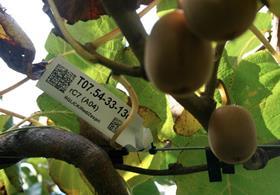
International kiwifruit marketer Zespri expects to be able to consider a red kiwifruit variety for commercial release in June 2012, the company has confirmed.
The news came as Zespri announced the release of new licences in New Zealand for the planting of up to 400ha of three varieties released for commercial planting in 2010, as the group looks to meet expected strong demand for premium-quality in the future.
Under the new licences, up to 200ha of sweet green variety Green14 and up to 200ha of gold variety Gold3 can be planted or grafted by growers over the next two seasons.
According to Zespri, this represents an increase of approximately 3 per cent in the area of land currently planted with kiwifruit in New Zealand.
The decision to licence more planted area follows an 11-year development programme led by Zespri in association with the New Zealand Government – through Plant & Food Research – and the Ministry of Science & Innovation.
Last year's commercial release followed five years of on-orchard, storage, shipping and taste tests carried out in New Zealand, Europe and Japan, as well as extensive work with growers and international customers.
Targeted decisions
Zespri chief executive Lain Jager said the licensing decisions were made in the context of market demand and industry growth targets, current learnings about each variety, and also the risks and impacts associated with recent outbreaks of bacterial vine disease Psa in New Zealand and Italy.
'New varieties provide the New Zealand kiwifruit industry with huge potential to energise and grow the category, and improve wealth for growers and the New Zealand economy,' he commented.
'We're anticipating strong future demand from both consumers and retail customers for a portfolio of premium-quality kiwifruit products, and our world-leading kiwifruit breeding programme is best placed globally to deliver that.
'Obviously, the industry is facing some uncertainty and challenges ahead with regards to the risks and impacts of Psa, and the decision to release further new variety licences was made in this context.
Zespri recently completed a series of meetings with kiwifruit growers around New Zealand, where there was apparently a clear signal of demand for kiwifruit licences, Jager said.
'Clearly it will be up to growers to assess the risks and make decisions that suit their individual circumstances,' he added. 'We'll be supporting that decision making process by providing extensive information about potential risks, and some growers may choose to wait until next season when we will have a clearer view of the Psa risk in particular.'
The gold variety being released has 'outstanding' production characteristics, Jager said.
'Growers tell us that Gold3 is a pleasure to grow and the lack of a beak means it handles well through the packing process. While it was originally thought to be an early extension to the GOLD selling window, Gold3 has also shown potential as a long-storing variety, so we're continuing to assess that possibility.
'We're conducting further storage research into Gold3 and another strong gold candidate, Gold9, and we'll consider releasing more licences in February next year.'
The new, sweet green variety will attract new consumers to the green category given its characteristically sweeter taste, Zespri believes.
'Green14 is more challenging to grow but we anticipate that, with limited volumes, it will deliver growers a significantly return than Zespri Green kiwifruit, so will be attractive to growers wanting to diversify into a premium niche green offering.'
Extensive programme
Jager said Zespri's kiwifruit breeding programme, in partnership with Plant & Food Research, currently has over 100,000 potential new seedlings, and is a key part of delivering Zespri's stated goal of tripling the New Zealand kiwifruit industry's export revenues to NZ$3bn by 2025.
There is currently particular interest in new red varieties being developed as part of the programme and, Jager confirmed, Zespri expects to be in a position to assess a red variety for commercialisation in June 2012.
'Zespri has a responsibility to its grower shareholders to ensure that new variety decisions are made with their commercial interests and the risks and impact of Psa in mind. That's why we proceed with caution, by releasing controlled volumes of only the very best kiwifruit, following a hugely extensive trial process, and we involve growers in those decisions.'



